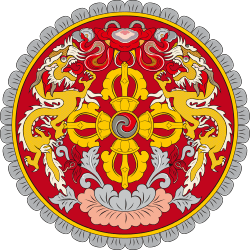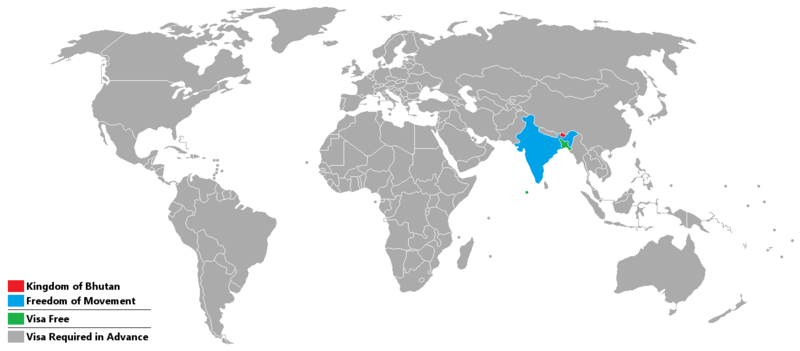Visa policy of Bhutan
Travel to the Kingdom of Bhutan is highly regulated under the policy "High Value, Low Impact Tourism" in order to minimize the impact on the country's unique society and environment. Bhutanese policy ensures that only a limited number of tourists enter the country at any one time, preventing it from being overwhelmed by mass tourism and thus altering its character, and that the tourists who do come get the most out of their visits.
 |
|---|
| This article is part of a series on the politics and government of Bhutan |
|
Monarchy |
|
Government |

Visa policy map

Visa exemption
Freedom of movement
Citizens of ![]()
Indian citizens can obtain entry into Bhutan by air and land, and may use any of the acceptable documents mentioned below to enter Bhutan:
- Indian Passport
- Voter ID card with photograph[1]
- Identification Slip issued by the Indian Consulate Office in Phuentsholing upon presenting proof of Indian citizenship.[2]
Visa free
Citizens of the following countries do not need a visa and a booking with a licensed tour operator to visit Bhutan, provided they have a passport valid for at least six months from the date of entry.[3][4]
Diplomatic, service and official passports
Holders of diplomatic or official/service passports of the following countries do not require a visa to visit Bhutan for up to 90 days.[4]
|
Restricted areas permit
Upon entering Bhutan, all foreigners are issued a 7 or 14 days "Entry Permit" by default, valid for Thimphu and Paro only. The rest of Bhutan is considered a restricted area, and foreigners need a "Restricted-Area Permit" to enter. Immigration checkpoints are located at important road junctions throughout the country, where police check the permits of all foreigners they find. In addition, foreigners wishing to visit Buddhist temples must obtain a "Temple Permit" from the Ministry of Culture.[5]
While these permits are typically arranged by the tour operators, Indian, Bangladeshi, and Maldivian visitors who did not book through a licensed tour operator must apply for them in person at the Immigration office in Thimphu. The permits can also be extended at the Immigration office in Thimphu for a charge. Citizens of Bangladesh, India, and Maldives are exempt from charges on issuance and extensions of permits.
Visa required in advance
All foreigners (except for citizens of Bangladesh, India, and Maldives) must obtain a visa before visiting Bhutan and may only enter Bhutan through Phuntsholing, Gelephu and Samdrup Jongkhar if coming by land or Paro if coming by air. If approved, they are given a visa clearance letter, and must present it at the port of entry. The visa is then stamped into their passport. Foreign tourists must use a licensed Bhutanese tour operator or one of their international partners to pre-arrange their visa and book their holiday. A daily fee is also charged for every day of stay. For most foreign tourists, it amounts to $250 a day during tourist high season, and $200 a day for low season.[6][7]
Discounts also apply for minors and larger groups while surcharges exist for groups smaller than 3. The minimum daily package required for visa processing covers accommodation, food, guide and vehicle with driver. Part of it goes towards free education, free healthcare and poverty alleviation in Bhutan.[6][1] Licensed tour guides accompany tourists during their trips and arrange accommodations - independent tourism by foreigners (except for citizens of Bangladesh, India, and Maldives) is prohibited.
The only exceptions for having to book a tour as a condition for being allowed to visit are for those who receive a formal invitation to Bhutan from "a citizen of some standing" or a volunteer organization,[8] and those who come as guests of the Bhutanese government.
Liberalization proposals
In 2009, the government of Bhutan hired the consulting company McKinsey to re-assess its policies on tourism. McKinsey’s plan to de-regulate tourism and allow an unlimited number of foreign tourists to enter the country was preliminarily approved by the Prime Minister and the cabinet, but finally rejected due to widespread opposition in the country. According to Canadian scholar Kent Schroeder, “the reversal of McKinsey’s liberalization proposal represented a significant triumph for many within the private sector and civil society.” [9]
Statistics
Most visitors arriving to Bhutan were from the following countries of nationality:[10] [11]
| Rank | Country or territory | 2017 | 2016 | 2015 | 2014 | 2013 | 2012 |
|---|---|---|---|---|---|---|---|
| 1 | 172,751 | 114,301 | N/A | N/A | N/A | N/A | |
| 2 | 10,536 | 7,753 | N/A | N/A | N/A | N/A | |
| 3 | 9,220 | 7,292 | 7,137 | 7,291 | 6,997 | 6,102 | |
| 4 | 6,421 | 9,208 | 9,399 | 8,111 | 4,827 | 3,816 | |
| 5 | 6,048 | 1,035 | N/A | N/A | N/A | N/A | |
| 6 | 4,129 | 3,015 | 2,587 | 1,720 | 2,051 | 1,611 | |
| 7 | 4,047 | 4,177 | 3,778 | 12,105 | 3,527 | 3,617 | |
| 8 | 3,246 | 3,124 | 2,958 | 2,680 | 2,309 | 2,491 | |
| 9 | 2,970 | 2,297 | 2,498 | 2,971 | 2,770 | 2,895 | |
| 10 | 2,956 | 1,967 | 1,546 | 2,067 | 2,054 | 1,312 | |
| 11 | 2,744 | 4,833 | 2,437 | 2,707 | 4,035 | 7,029 | |
| 12 | 2,249 | 1,818 | 1,833 | 2,037 | 2,062 | 1,950 | |
| 13 | 1,545 | 1,501 | 1,563 | 1,636 | 1,572 | 1,863 | |
| 14 | 1,524 | 1,110 | N/A | N/A | N/A | N/A | |
| 15 | 1,491 | 1,812 | N/A | N/A | N/A | N/A | |
| 16 | 1,423 | N/A | N/A | N/A | N/A | N/A | |
| 17 | 1,352 | N/A | N/A | N/A | N/A | N/A | |
| 18 | 1,142 | N/A | N/A | N/A | N/A | N/A | |
| 19 | 978 | N/A | N/A | N/A | N/A | N/A | |
| 20 | 757 | N/A | N/A | N/A | N/A | N/A | |
| 21 | N/A | 243 | N/A | N/A | N/A | N/A | |
| Total | 237,529 | 209,570 | 155,121 | 133,480 | 116,209 | 105,407 |
References
- "Visa". Retrieved 11 June 2015.
- "Welcome to Embassy of India Thimphu, Bhutan". Retrieved 11 June 2015.
- "Visa for coming to Bhutan". Retrieved 11 June 2015.
- "Country information (visa section)". Timatic. International Air Transport Association (IATA) through Olympic Air. Retrieved 1 April 2017.
- "bhutan travel information, cultural tours, himalayan adventure". Retrieved 11 June 2015.
- "FAQ". Retrieved 11 June 2015.
- "Travel Requirements". Retrieved 11 June 2015.
- Sharell Cook. "How to Travel to Bhutan". About.com Travel. Retrieved 11 June 2015.
- Kent Schroeder, Politics of Gross National Happiness: Governance and Development in Bhutan, Cham (Switzerland): Palgrave Macmillan, 2018, 60–63.
- Bhutan annual reports
- "Выезд граждан России". Fedstat.ru. 2018-02-13. Retrieved 2018-03-12.